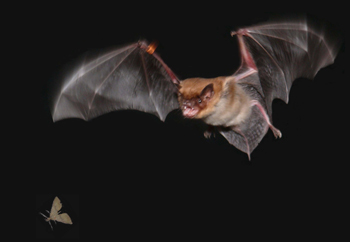
|
 |
An echolocating bat (Eptesicus fuscus) pursuing and attempting to capture a moth in dark in the flight room of the Auditory Neuroethology Laboratory at the University of Maryland. The picture is provided courtesy of Professor Cynthia Moss. The photograph was taken by Ms. Jessica Nelson with a still camera. |
|
"Pursuit and an Evolutionary Game," a paper by Professor P.S. Krishnaprasad (ECE/ISR); Dr. Eric Justh, and MIT Ph.D. student Ermin Wei has been published in The Royal Society's journal, Proceedings of the Royal Society A. The article citation is here.
Neuroethologists who study flight behavior in insects and in echolocating bats have known for some time that there are geometric regularities in the flight. The work by Krishnaprasad, Justh and Wei offers for the first time a possible evolutionary basis for the observed patterns.
Pursuit is a familiar mechanical activity found in nature, manifested in behaviors such as prey-capture, mate-chasing, and human team sports. The authors of the above-referenced paper devise models to explore the idea that there is an evolutionary process that underlies the adopting and adjusting of patterns of movement in pursuit. Using the geometry of probability spaces and the theory of evolutionary games, the authors set up a competition between different patterns or strategies. The strategy that prevails is identifiable with one favored by dragonflies engaged in aerial battles, and echolocating bats seeking insect prey.
Krishnaprasad writes, "It is observations of such pursuit behavior in nature that inspired our theoretical and computational work. Our work is a natural outgrowth of the experimental work in Professor Cynthia Moss's (Psychology/ISR) Auditory Neuroethology Laboratory and the papers that resulted from them."
About the co-authors
P.S. Krishnaprasad has been on the faculty of the University of Maryland since 1980, and has held a joint appointment as Professor of Electrical Engineering and of the Institute for Systems Research since 1988.
Dr. Eric Justh is an electronics engineer at the Naval Research Laboratory. He earned his Ph.D. in Electrical Engineering at the University of Maryland in 1998, advised by Dr. Krishnaprasad. From 1999 to 2001, he was an ISR postdoctoral researcher, and from 2001 to 2006 he was an assistant research scientist at ISR.
Ermin Wei graduated from the University of Maryland in 2008 with a B.S. in Computer Engineering, a B.S. in Mathematics, a B.S. in Finance and a minor in German. She is currently a Ph.D. student in electrical engineering at the Massachusetts Institute of Technology.
About the journal
Proceedings A has an illustrious history of publishing pioneering and influential research articles across the entire range of the physical and mathematical sciences. These have included Maxwell's electromagnetic theory, the Braggs' first account of X-ray crystallography, Dirac's relativistic theory of the electron, and Watson and Crick's detailed description of the structure of DNA.
February 26, 2009
|

